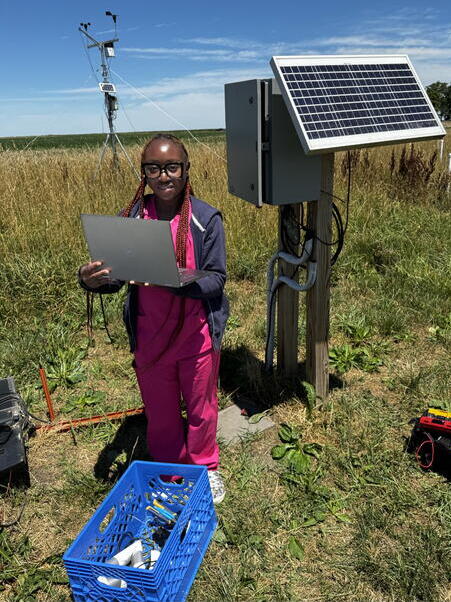From Golden Tiger to Illini: ACES brings together students from across the country for summer program

As a rising senior with an animal and veterinary science major at Tuskegee University — home of the Golden Tigers — Kyeaira Faustin does not call the University of Illinois Urbana-Champaign her everyday campus. But becoming a temporary Illini during last year’s Research Experience for Undergraduates (REU) at the Center for Digital Agriculture (CDA) revealed new passions that Faustin is now pursuing back at home.
“I became interested in the Center for Digital Agriculture program because it presented me with an opportunity to learn more about how agriculture and technology intermingle,” Faustin said. “One of the reasons I really recommend this program for others is because it's a way for anyone to enhance their skills to suit any career or path you want to take in agriculture.”
The Center for Digital Agriculture’s REU program spans 10 weeks each summer, bringing together students from different backgrounds in computation, agriculture, and biosystems. Those accepted into the program reside at the U. of I. for the summer, participating in professional development and conducting research mentored by CDA faculty affiliates and graduate students. The projects students complete as part of the REU experience span across the full scope of digital agriculture.
Participants also join students from other REU programs across the U. of I. campus in presenting their research at the STEM Career Exploration and Symposium, being held this year on July 24 at the Illini Union. This day-long event hosts nearly 600 attendees and fosters employer-student connections, interdisciplinary discussions, and broadening participation in STEM. In addition to the U. of I. and visiting undergraduate researchers and their mentors, high school and community college students and educators, as well as other community members, are invited to attend and explore STEM careers, supports, and pathways. Register by July 1.
“I had a great time presenting during the program’s symposium. There were so many people who were interested in what we had to say,” Faustin said.
At the symposium, Faustin presented her work with Luciano Alves de Oliveira, assistant professor in the Department of Agricultural and Biological Engineering, part of the College of Agricultural, Consumer and Environmental Sciences, and The Grainger College of Engineering.
“I worked with Dr. Oliveira on the wood chip bioreactor, which aims to reduce the amount of nitrate being discharged into streams. I also helped conduct research that compared manually collected nitrate concentrations with samples collected by nitrate sensors, which are more accurate and less labor-intensive,” Faustin explained. “It was rewarding to know I was helping, even in a small way, to reduce nitrate pollution into waterways.”
The data that Kyeaira collected will also be used in the future to do predictive modeling to help understand the impact of different farming practices, in conjunction with the bioreactors, on nitrate discharge.
Although her time at Illinois came to an end, it represented a new chapter in Faustin’s life.
“Right now, I am taking on an environmental science minor alongside my animal science major, and the CDA program played a big role in my choice to do so. Working with and learning from this project made me realize that I have a passion, not only for animals, but for plants and the environment as well,” Faustin said.
The Center for Digital Agriculture’s Summer Research Experience application for Summer 2026 opens in November. To learn more about the application process and how to get involved, visit the Center for Digital Agriculture’s website. Students from colleges with limited research opportunities for undergraduates, including community colleges, are strongly encouraged to apply.